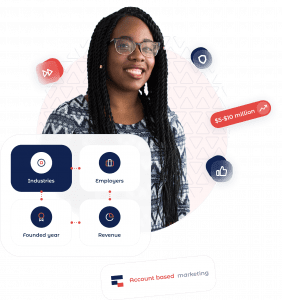In B2B personalization and targeting, one of the key strategies is to use IP intelligence or ABM data, to know critical information about leads on the website. This is especially relevant to things that can’t be otherwise known by first-party data alone, such as how they’ve interacted with your website, and if they haven’t filled out any sort of forms identifying themselves yet.
For otherwise anonymous leads like this, using IP intelligence data from sites like LeadRebel, SixSense, Albacross, ClearBit, LeadFeeder, and others can be a game changer for getting new leads into the funnel, by showing custom, highly relevant content based on their lead variables.
The result is that when an anonymous visitor comes to your site from a certain company, their IP address is used as an identifier which calls data such as company size, revenue, or industry from the ABM data provider. This happens instantly, so that by the time the page is loaded, the relevant personalizations will be in place.
Utilize IP intelligence data to populate custom forms, or show landing page headers and calls to action based on industry or role, for instance. You can also combine IP intelligence data with your CRM data, so that, for instance, you can take into account things like their stage in your funnel, as well as the information about their industry or role, etc. Use A/B testing to try different strategies and determine what works best.
How is this data used in your ABM conversion optimization?
- Targeting — Tailor your site headers, banners, popups, forms, and other content based on ABM data, such as company size or industry
- A/B Testing — Test pricing based on company size or industry, calls to action with creative based on industry,
- Recommendations — Recommend content based on industry or company size
Where does IP intelligence come from?
Data distributed for IP intelligence is acquired and brokered from a variety of sources, primarily by companies who specialize in collecting business metrics, such as industry, number of employees, revenue, etc., and some vendors will also get this data from LinkedIn or their company’s usage of their technologies, collected by crawlers or other methods.
How does it work with personalization?
The basic mechanics of using IP intelligence data with your personalization engine are fairly straightforward. It consists of getting the relevant data to the personalization engine you’ve integrated with your site, in our case Personyze, and then telling the system what content to show, based on which variables are present for any given lead.
- When a visitor arrives on your site, an API call is made to your ABM data provider with the visitor’s IP address
- The company data is retrieved from the ABM provider, and stored under the user profile data in Personyze, which will be stored as a visitor attribute to be used now and in future sessions.
- Personalization and targeting takes place by triggering campaigns based on the visitor’s ABM data combined with other behavioral criteria, which then make changes to content such as adding dynamic tags such as company name, changing content headers based on industry, or CTAs based on company role or department.
Setting up your account based marketing data integration
The first part involves an API key, which you acquire from the data provider and put into Personyze, in the integrations area (or provide your account manager, if we don’t have a plug-and-play integration with your particular provider; we will make it work). At that point, you also let Personyze know which variables to “call” from the provider, via API, such as the industry, company size, company role, or any other variable you want to know about your leads.
Now, these variables will be available for targeting in your targeting campaigns, and even as filters or factors for algorithms to consider when they create product or content recommendations. These things will be known about each user based on their IP address.
A major advantage of this type of data is that it will not require a unique ID, cookie, or any other method to match the variable profile to the user, which are required, for instance, in CRM targeting.
Assessing IP Intelligence Providers
As easy as this is to set up, deciding to use IP intelligence presents B2B marketers with another dilemma: What data provider do I use?
There are many IP intelligence/ABM data providers on the market, all with relative advantages and disadvantages. Personyze can also work with multiple providers simultaneously.
There is variation in the geographic areas they specialize in, for instance, with some providers having better lead data in America and Europe, and others with better data in Asia and elsewhere.
They also vary in terms of the granularity of data they provide. Many can only provide higher level variables like industry, which is still quite useful for marketers, but then others may provide more granular data such as lead roles; the accuracy of this granular data is a whole other question.
Data accuracy is especially an area of concern now, when so many people are working from home, and not necessarily always on company IP addresses.
So, how do you decide?
We can’t tell you exactly which ABM provider is right for you, because there are so many variables involved, and many of the relevant variables like accuracy of data are practically impossible for us to assess.
However, what we can do is give you a few pointers on what you should be asking potential providers, and also some ways to get started by testing them out.
- What level of granularity is the data you provide?
- This will have a big impact on what you can achieve with your IP intelligence targeting. It’s possible you only need more general data, and services only providing that will likely be cheaper, but this is something you absolutely should know.
- How does integration with other platforms work?
- Good IP intelligence providers will be able to integrate with various platforms, such as your CRM, and of course for ABM personalization, also with your personalization engine. This should also be a fairly straightforward process, with usually just an API key required to set up the integration.
- Pricing
- Of course this will be a primary consideration, but you might be surprised by how much the pricing from solution to solution varies, and not always in a way that reflects the level of service provided.
- Is there a free trial, and if so, how long can it last?
This final point is especially important if you want to try out a data provider before committing, which we recommend. Since so much about these data providers is hidden, such as exactly how accurate their data actually is, a good trial of their software is a no-brainer, especially given the substantial price-point of most solutions.




















